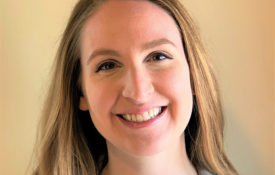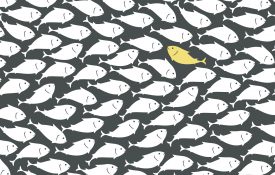
Goals and Motivation
Effort, stamina, and purpose drive our accomplishments — science shows us what to do to keep motivation going.
Group-based control theory proposes that social identification with agentic in-groups—groups with a common goal—and engagement in collective action allow people to restore and maintain a sense of control and can help efforts feel less futile, even when the odds seem stacked. Visit Page

Entrepreneurship poster award winners Lining Sun of the National University of Singapore and Heather Han of Northern Kentucky University will each receive $1,500 and free registration to the 2022 APS Annual Convention in Chicago. Visit Page

Encouraging young people returning from juvenile detention to share their goals with an educator could help them stay in school and out of the criminal justice system. Visit Page

Interventions that encourage students to attribute academic failure to controllable factors could help boost graduation rates. Visit Page

For successful messaging to older adults, ditch the stereotypes, consider their future time horizons, and help them savor the moments they can enjoy. Visit Page

Children are more likely to control their immediate impulses when they and a peer rely on each other to get a reward than when they’re left to their own willpower, new research indicates. Visit Page

What keeps us invested in working for more than just a paycheck? From Maslow’s hierarchy of needs to self-determination theory, researchers are drawing on psychological science to understand the factors that keep employees engaged. Visit Page

People with a growth attitude may explore different interests and fight through challenges and setbacks, helping them to learn to love what they do, researchers find. Visit Page

Advice on how to shift gears and stay productive during graduate training. Visit Page

Employees can shape their environments to improve their experience at work and their performance. Visit Page

To craft motivating messages, you need to know which side your target audience is on: the favorite or the underdog. Visit Page

Putting in a lot of effort to earn a reward can make unappealing prizes more attractive to kindergartners, but not to preschoolers, according to research published in Psychological Science, a journal of the Association for Visit Page

People are more motivated to pursue a new goal, like hitting the gym or saving for retirement, on specific dates. Visit Page

A field study in Malawi indicates that psychological factors play an important role in whether girls attended school, even under conditions of extreme poverty and deprivation Visit Page

New research finds that just the sense that we’re working together with others can dramatically increase our motivation to complete difficult tasks—even when we’re actually working alone. Across five experiments Stanford psychological scientists Priyanka B. Visit Page

How do great rivalries in sports and business drive the performance of the competitors? A recent study provides some answers. Visit Page

Many professionals are driven by a pure passion for their work, finding reward in simply doing a good job, delivering a great service, or producing a great product. For these people, their career is not Visit Page

If you're trying to end racism, it's not enough to get people to understand that racism is still a problem. You also have to make them feel like they can do something about it, according to a study published in Psychological Science. Visit Page

Too many Americans can't afford an emergency expense. Psychological science can help. Visit Page

Psychology researchers present cutting-edge science that may help us adopt newer, healthier, or safer behaviors. Visit Page

It's World Immunization Week. The new issue of Psychological Science in the Public Interest details the behavioral strategies that scientists have tested to increase vaccination rates across the globe. Visit Page

Individuals who make concrete plans to meet their goals may engage in more physical activity, including visits to the gym, compared to those who don’t plan quite so far ahead, research shows. Visit Page

Behavioral researchers are begun investigating a phenomenon called pre-crastination, or rushing to get things done even if requires unnecessary effort. Visit Page

Measuring time in days instead of months, or months instead of years, can make future events seem closer and thus more urgent. Visit Page

A group of prominent psychological scientists outlines specific solutions to help individuals and policymakers maintain healthy habits. Visit Page

Linking tasks that we intend to complete to distinctive cues that we’ll encounter at the right place and the right time may help us remember to follow through. Visit Page

We're most enthusiastic about projects when we start and finish them, but intervening hassles can turn determination soft. Visit Page

Backup plans can change the way that a person pursues a goal, as well as the likelihood of achieving it, even if the backup plans are never even used. Visit Page

People are more likely to choose healthy options at the grocery store if they use the risk of losing their monthly healthy food discount as a motivational tool. Visit Page
